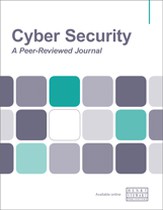Civil liberties vs national security in the encryption debate: Exceptional access and the trust deficit
Abstract
This paper analyses the challenges of reconciling the need for strong data privacy technologies with the US Federal Government’s demand for access to encrypted data to combat national security threats — a concept known as ‘exceptional access’. Using the 2015 San Bernardino terrorist attack as a jumping-off point, this research combines public statements and arguments made for and against exceptional access to reveal a widening trust deficit between technologists and law enforcement authorities. The paper highlights specific intersections of policy and technology which have led to this increasing gulf and provides recommendations for how the gulf can be bridged to promote constructive dialogue between the two groups.
The full article is available to subscribers to the journal.
Author's Biography
Brittany Bieber is a Master of Public Policy candidate at the Goldman School of Public Policy at the University of California, Berkeley. Brittany is a graduate fellow for the Committee on Information Technology (COIT) — the technology governance body for the City and County of San Francisco — and a graduate researcher for Michael Nacht. In her studies Brittany is focusing on cyber security, data privacy, and governance of Internet of Things (IoT) and other emerging technologies. Brittany received a Bachelor’s degree in political science from Boston College.
Ahmad Sultan is the Associate Director for Research, Advocacy and Technology Policy at the Anti-Defamation League’s Center for Technology and Society. Ahmad’s background in technology policy focuses on underserved and vulnerable populations and his policy expertise includes the fields of cyber security, cyber harassment and data privacy. Ahmad has worked with the Committee on Information Technology (COIT), where he helped shape the City of San Francisco’s cyber security initiatives. He is currently advising the Berkeley Research on Autonomous Vehicle Opportunities (BRAVO) team on privacy and security matters. Previously, Ahmad has led poverty alleviation projects at the World Bank and the Center for Economic Research in Pakistan. Ahmad has a Master of Public Policy degree from the Goldman School of Public Policy at the University of California, Berkeley, where his Master’s thesis was a finalist for the Smolinsky Prize for Best Thesis. Ahmad also has a Master of Arts degree in economics from the University of Glasgow.
Michael Nacht is Thomas and Alison Schneider Professor of Public Policy, Goldman School of Public Policy, University of California, Berkeley. Michael served as Assistant Secretary of Defense for Global Strategic Affairs (2009–10), where he helped shape policy guidelines for the newly established US Cyber Command. Michael recently co-authored Strategic Latency: Red, White and Blue — Managing the National and International Security Consequences of Disruptive Technologies, published by the Lawrence Livermore National Laboratory.
Sabhanaz Rashid Diya is a computational social scientist working in international development and governance. Her background in technology policy focuses on data analytics, policy and privacy for underserved populations. Diya has over eight years’ experience working with governments and advocacy organisations, advising on information policy. Previously, she has worked with the World Bank on economic policy, USAID on randomised evaluations and Google on implementation design in South Asia and Southern Africa. In her Master’s thesis, Diya worked with ACLU of Northern California on surveillance policy and applied advanced analytics to predict likelihood of surveillance as a function of structural discrimination. Diya received her Master of Public Policy from UC Berkeley’s Goldman School of Public Policy and her Bachelor of Social Science in Economics from Independent University Bangladesh.
